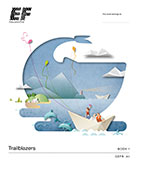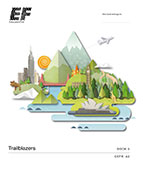Books and English Level Matching Chart
Trailblazers’ rigorous teaching program is designed in accordance with the leading international standard measurement for English language proficiency, the Common European Framework of References for Languages (CEFR), thus providing the approximate equivalent scores of internationally recognized English language proficiency exams like Cambridge Exam, TOEFL and IELTS.

-
Book 1
Book 1 is the first book in the CEFR A1 level. This book takes students from introducing themselves and talking about pets and school subjects, to spending time with friends and attending parties. Over 300 words from these topics and key national exams are covered.
Students will learn grammar points such as the present simple tense, wh-questions and adverbs of sequence. They will also develop skills related to making formal presentations and using and interpreting non-verbal communication, as well as choosing the most viable option available.
Learning Focus Vocabulary Grammar Transferable Skills Learning Outcomes UNIT 1

First Day
Introductions
Introducing yourself to new friends
- Numbers
- Months and dates
- Hobbies and interests
- Present simple: ‘to be’
- Capitalization
Interacting successfully with classmates
- Give a simple self introduction
- Ask and answer questions about hobbies and interests
UNIT 2

Man's Best Friend
Pets
Talking about pets and their abilities
- Actions
- Adjectives: character
- Colours
- Pets
- Yes/no and wh-questions
- ‘Can’ and ‘can’t’for ability
- Possesive determiners
Presenting ideas and information clearly and concisely
Making formal presentations- Give a short presentation about a pet, including its appearance and abilities
- Answer questions about a presentation
UNIT 3

Friday Fun
Food and Activities
Deciding what to eat and do when a friend visits
- Food and drinks
- Indoor activities
- ‘would like’and ‘want to’
- ‘Because’for reasons
Identifying all possible options
Interacting successfully with classmates- Expressing preferences for food and drinks
- Place an order for food
- Give suggestions about what activity to do
UNIT 4

Class Act
School Subjects
Talking about your school, favourite subjects and friends
- School subjects
- People and places at school
- Adjectives: personality
- ‘There is/are …’
- ‘Like’ and ‘good at’ for abilities
- ‘Either’ and ‘too’ for agreement
Using non-verbal communication
- Talk to a friend about school subjects and facilities
- Ask and answer questions about abilities and interests at school
UNIT 5

You're Invited!
Parties
Buying a gift and going to a party
Game instructions
- ‘Let’s’ for suggestions
- Adverbs of sequence
Choosing the most viable option
Interpreting non-verbal communication- Talk to people about their likes and dislikes, in order to choose gifts
- Explain and follow rules for a game
-
Book 3
Book 3 is the first book in the CEFR A2 level. This book takes students from sharing recent holiday stories and discussing music genres, to exploring social media, future careers and school projects. Over 300 words from these topics and key national exams are covered.
Students will learn grammar points such as gerunds and infinitives, past simple verbs, question words and prepositions. They will also develop skills related to decision-making, making presentations, and organizing information.
Learning Focus Vocabulary Grammar Transferable Skills Learning Outcomes Unit 1

Destination: Everywhere
Vacations
Describing and comparing vacation destinations and activities
- Describing vacation destinations (countries, places)
- Activities
- Food descriptions
- Prepositions of place
- Comparative ‘as … as’
- Past simple verbs
- Question words
Presenting content and style appropriate for the chosen audience
- Describing a recent vacation
- Discuss locations, food and photos by comparing vacation experiences
Unit 2

Follow Me
Social Media
Create a profile to make friends online and safely chat about your interests
- Online (and internet) vocabulary
- Responding to comments
- Modals of obligation, advice and permission ('must', 'have to', 'should')
- 'Too' for agreement
- Exclamatory questions
Interacting successfully with classmates
- Create an online profile
- Write, read and respond to posts appropriately
- Make friends by identifying common interests
Unit 3

Rock On
Music
Learn how to create a playlist, make group decisions and plan a day trip to a music festival
- Music genres
- Giving opinions
- Describing people and music
- Commenting on song
- Gerunds and infinitives
- 'So' and 'such' for emphasis
Choosing the most viable option
- Discuss genres, bands and musicians
- Express opinions, likes and dislikes, giving reasons for preferences
Unit 4
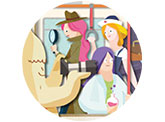
Out of Office
Jobs
Learn how to discuss jobs and plan your future career
- Jobs
- Workplaces
- Job functions
- Relative clauses with 'that' and 'who'
- 'That' clauses
- 'Going to' with future meaning
Establishing objectives and needs for a plan
- Discuss future jobs, expressing hopes, desires and intentions
- Prepare for a specific job by making a plan of action
Unit 5
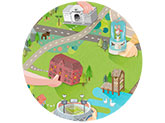
No Place Like Home
School Projects
Research your hometown and make a school project to present to the class
- Describing places around towns, cities and landmarks
- Project language
- Compass directions
- Could' for polite requests
- 'Will' with future meaning
- 'Used to' to describe changes over time
Organizing information, people or things in a systematic way
- Organize tasks within a group
- Make a project plan
- Deliver a presentation about how things have changed in a town
-
Book 4
Book 4 is the second book in the CEFR A2 level. This book takes students from discussing movies and making free time plans to writing and editing short stories, making schedules, attending events, and making friends on holiday. Over 300 words from these topics and key national exams are covered.
Students will study grammar points such as modals of possibility, prepositions of time and the past continuous tense. They will also develop skills related to reviewing ideas and making objective judgments, organizing information and interpreting non-verbal communication.
Learning Focus Vocabulary Grammar Transferable Skills Learning Outcomes UNIT 1
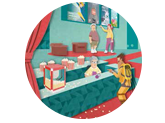
Lights, Camera, Action!
Movies
Talking about movies and their popularity
- Describing opinions about movies
- Summarising movie plots
- Modals of possibility
- Reporting verbs
Generating new ideas, inventing new things, creating new images or designs
- Discuss the popularity of movies and TV shows
- Predict a movie’s plot
- Outline an idea for a TV show
UNIT 2
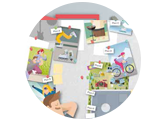
Home Sweet Homestay
Free Time Activities
- Make plans for the weekend
- Give and respond to sugestions and invitations
- Free time activities
- Making suggestions
- Time expressions
- ‘Could’ for possibility
- Prepositions of time
- ‘Really’ as an intensifier
Reviewing different ideas and making objective judgements
- Make plans for the weekend
- Give and respond to sugestions and invitations
UNIT 3

Once Upon a Time
Short Stories
Writing and editing short stories
- Advice and feedback
- Stories
- Logical connectors for order, reason and time
- Past continuous tense
Organizing information, people or things in a systematic way
- Read and discuss a variety of short stories
- Plan, write and edit short stories
- Give suggestions for improvements
UNIT 4

Planet Con
Events
Going to events
- Scheduling language
- Shopping and merchandise
- Showing appreciation
- ‘Going to’ + ‘be’ for prediction
- Tag questions
Finding and collecting relevant background information
- Learn about an event to attend
- Understand rules
- Buy food and merchandise
- Share experiences, feelings and opinions after an event
UNIT 5

Friendships Beyond Borders
Consolidation
Consolidation and review
Countries, events, free time activities, interests, jobs, music
‘As … as’ for comparison, certainty, tag questions, ‘will’ and ‘going to’, preferences, suggestions
Interpreting non-verbal communication
- Review and expand on key points from Books 3 and 4
- Make friends on a holiday abroad
-
Book 5
Book 5 is the first book in the CEFR B1.1 level. This book takes students from planning day trips and various events, to discovering book genres and museum exhibits, and learning classroom skills. Over 300 words from these topics and key national exams are covered.
Students will learn grammar points such as the past simple and continuous tenses, phrasal modals and superlatives. They will also develop skills related to finding new solutions to problems, recognizing personal strengths and weaknesses, and evaluating and choosing the best available option.
Learning Focus Vocabulary Grammar Transferable Skills Learning Outcomes UNIT 1

City Escape
Day Trips
Planning a fun day trip with friends
- Places
- Transport
- Weather
‘Shall’ for suggestions
Finding new solutions to problems
- Make plans for a day trip, deciding what to bring and do next
- Discuss feelings about an ongoing day trip
UNIT 2
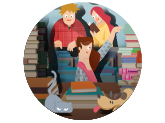
Page One
Books
Summarizing and reviewing books and stories
- Book genres
- Adjectives of opinion
- Past simple tense
- Past continuous tense
- ‘when’ and‘while’
Presenting opinions and ideas in an open, objective way
Discuss and write about opinions of specific books and genres of writing
UNIT 3

Make the Grade
Classroom Skills
Discussing strengths and weaknesses at school
- Classroom skills
- School subjects
- Reported speech
- Passive voice
Presenting ideas effectively to a group
Contributing effectively to a team- Discuss school schedules and feedback from teachers
- Write a short academic report and present it to the class as part of a project
UNIT 4

Exhibit This
Museums
Going to a museum and finding your way around
- Museum exhibits
- Museum vocabulary
- Directions
- First conditional
- Phrasal modals
Planning projects, events and programmes
- Plan and take part in a school trip, following rules and directions
- Compare, contrast and report on different exhibits in a museum
UNIT 5

World Records
Event Planning
Organizing a record breaking attempt
- Activities
- Places at school
- Team roles
- Indefinite pronouns
- Superlatives
Evaluating and choosing the best option for an event
Recognizing one’s own strengths and weaknesses and playing a team role accordingly- Compare activities to decide what event to hold
- Organise an event, including practice, planning, promotion, running and monitoring of the event
-
Book 7
Book 7 is the first book in the CEFR B1.2 level. This book takes students from weighing the pros and cons of different holiday activities and persuading friends to try new things, to telling funny stories, discussing global issues and giving advice to team members. Over 300 words from these topics and key national exams are covered.
Students will learn grammar points such as conjunctive adverbials, compound conditionals and indefinite pronouns. They will also develop skills related to planning events, drawing specific conclusions from a set of general observations and motivating others to act.
Learning Focus Vocabulary Grammar Transferable Skills Learning Outcomes UNIT 1

The Great Outdoors
Holiday Plans
Planning a dream holiday
- Holiday activities
- Seasons
- Conditionals with ‘unless’
- Modifying comparatives and superlatives
Weighing the pros and cons
Compare holiday destinations and activities
UNIT 2

A Tale of Two Cities
Persuasion
Persuading friends to try new things
- Scary activities
- Free-time activities
- Fears
- Compound conditionals
- Causitive constructs
- Progressive change
Motivating others to act
Use well-formed arguments to persuade someone to do something
UNIT 3
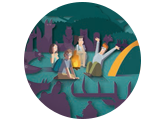
Tall Tales
Jokes and Arguments
Making jokes, arguing and making up with friends
- Agreement and disagreement
- Adjectives: describing stories
- Comparative:‘as … as’
- Conjunctive adverbials
- Tag questions
Using humour effectively
Remaining objective when mediating a disagreement- Tell humourous stories using similes and hyperbole
- Make compromises in an argument
UNIT 4
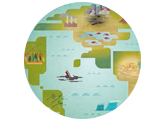
Save the Planet!
Global Issue
Fundraising to help fix world problems
- Charity
- Disasters
- Feelings
- Social problems
- Compound conditionals
- Passive voice
Suggesting solutions to problems
- Discuss options for possible solutions to global issues
- Plan and advertise a fundraiser to raise awareness for global problems
UNIT 5
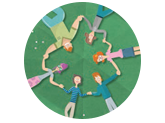
The Dream Team
Advice
Giving advice to work better with others
- Sharing concerns
- Personal attributes
- Modals: advice
- Third conditional
Drawing specific conclusions from a set of general observations
Discuss team-related problems and give advice to solve these issues

